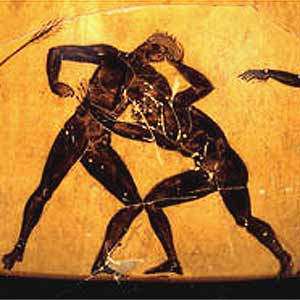“One of the essential components of drama is tension…Drama, so said drama critic William Archer, is almost always the effect of ‘anticipation mingled with uncertainty.'”
Alexander Mackendrick
“We knew no time for sadness, that’s a road we each had crossed.”
Pieces of April
Lyrics by Dave Loggins, recorded by Three Dog Night
“Passivity in a character is a real danger to dramatic values. ‘Protagonist’ (the name given to the leading character in your story) literally means the person who initiates the agon (struggle). But a figure who does not (or cannot) actually do things or who hasn’t got the gumption to struggle in a way that produces new situations and developments is apt—in dramatic terms—to be dead weight on the narrative. In effect, a bore.”
Writer/ director Alexander Mackendrick
On Film-making
Page 11
I wish when I was younger someone would have explained that the word protagonist flowed from the Greek word agōn, and basically meant struggle. (The word agony also has roots in agōn.) I used to prefer the term hero to protagonist. But thinking of your main character as the one who struggles—and the antagonist as the one struggling against your main character—conjurers up powerful imagery.
The Olympic Games started in Greece so here’s a good visual of wrestling in Ancient Greece that also symbolically represents modern screenwriting. (Think of if as Screenwriting from Greece.)
Keep in mind that while the struggle can be as grand as saving the world (Deep Impact), it can also be as simple as cooking a turkey (Pieces of April). In fact, the micro-budget Pieces of April written and directed by Peter Hedges is a good example of having a character struggling on many levels. April (Katie Holmes) not only struggles to find a place to cook her Thanksgiving dinner after her oven breaks, but she struggles with her neighbors, her boyfriend, her family, society, herself—she even has conflict with the salt and pepper shakers.
In fact, if you’re looking for a film school for under forty bucks pick up Mackendrick’s On-Filmmaking, a used copy of Seven Famous Greek Plays (introduction by Eugene O’Neil), and the DVD of Pieces of April (which has a commentary by Hedges). Pieces of April is tour de force of quality writing and acting.
P.S. If you’re new to screenwriting then today is your lucky day. Because if you can simply do two things in your screenwriting— 1) Have an active protagonist, and 2) Have a level of tension/conflict in every scene—you will have a heads-up on most scripts written. Any script readers out there want to say what percentage of screenplays they’ve read where two major problems were passive characters and lack of conflict?
Related post:
Don’t Bore the Audience!
Everything I Learned in Film School (Tip #1)
Meet Your First Audience (Tip #36)

